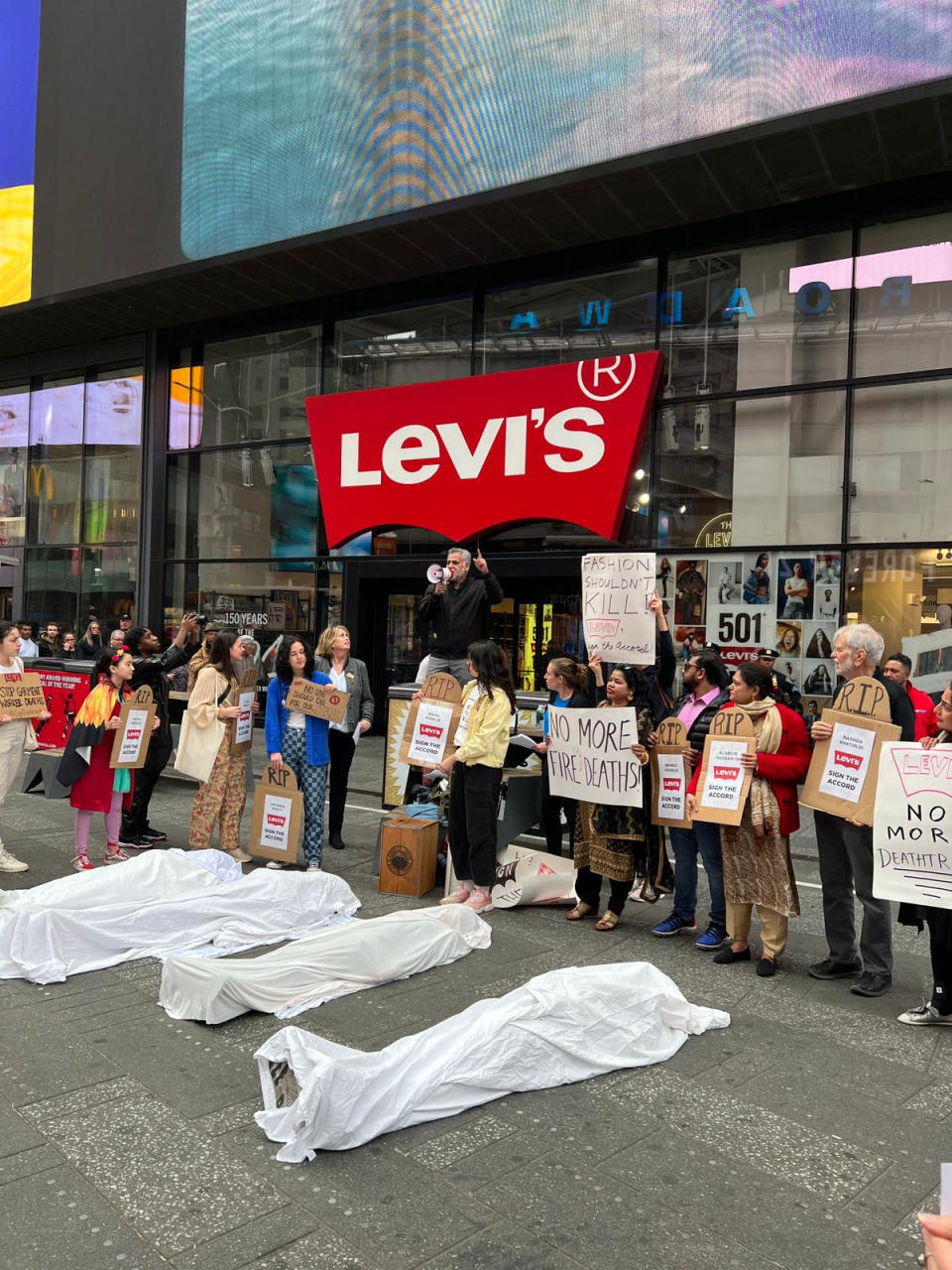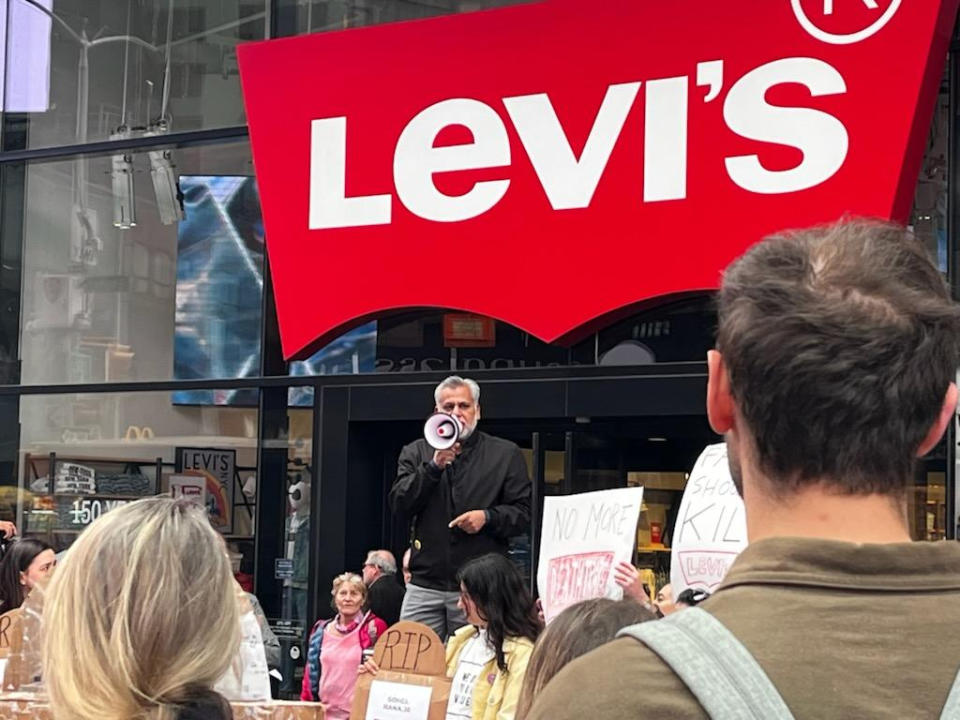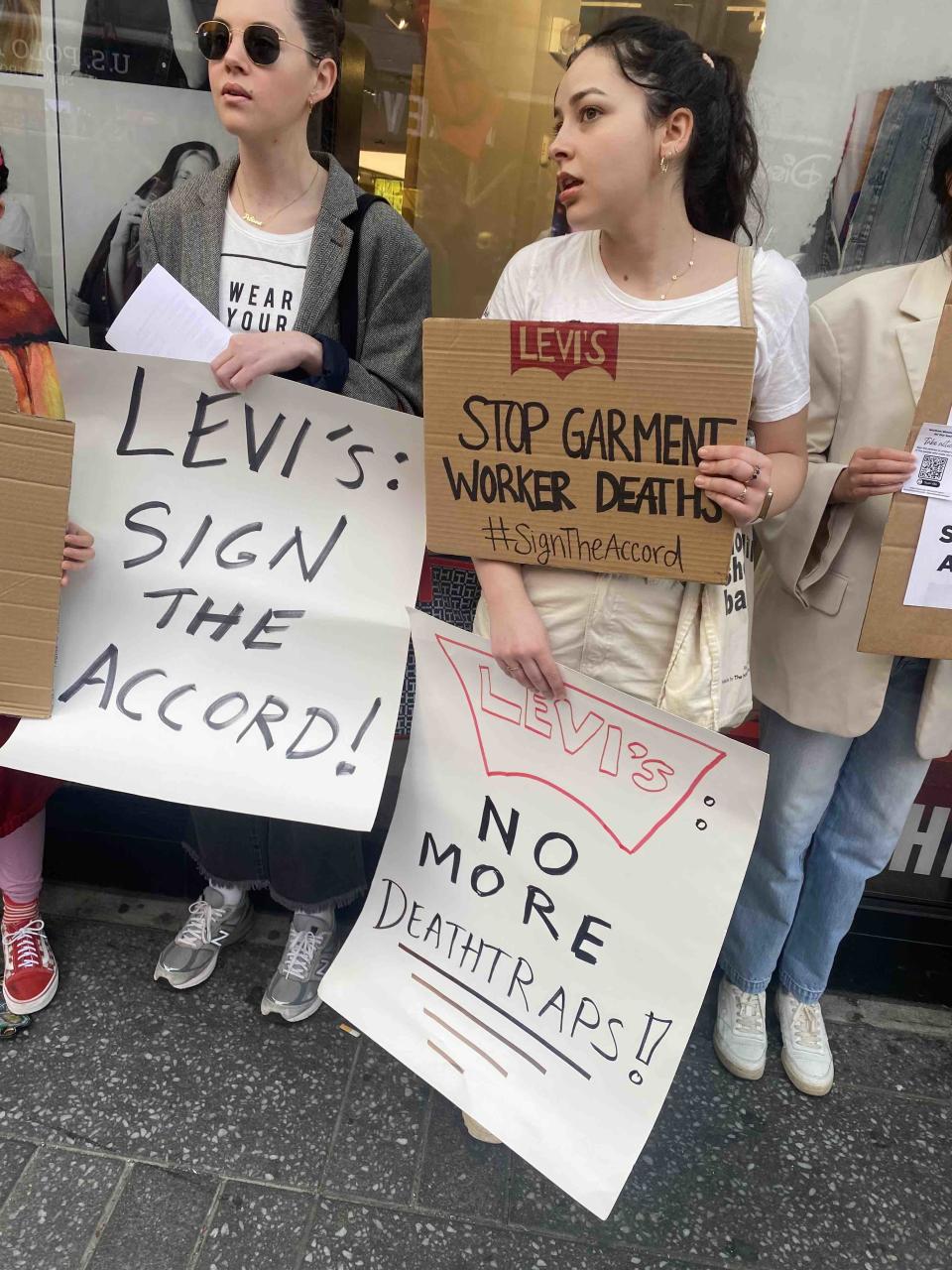Levi’s Urged to Sign Pakistan Accord: ‘We Really Need Brands to Step Up’

With the 10th anniversary of the Rana Plaza building collapse that killed more than 1,100 garment industry workers in Bangladesh and maimed scores of others serving as a backdrop, labor and human rights activists took to Times Square on Friday to protest U.S. denim giant Levi’s, which has refused to sign the Pakistan Accord addressing safety in the garment sector.
To date, 49 apparel companies have signed the Accord, a binding, three-year agreement empowering independent safety investigators to inspect more than 300 Pakistani manufacturing facilities and guarantee certain health and safety provisions for workers. Another 52,000 individuals have signed a petition asking Levi’s to sign on as well.
More from Sourcing Journal
“We really need brands to step up because the conditions we saw in Rana Plaza 10 years ago are very similar to the conditions we see today in Pakistan,” Ayesha Barenblat, founder and CEO of Remake, one of several organizations on hand for the Friday demonstration, told Sourcing Journal. “We just haven’t seen enough leadership from American brands, and Levi’s claims to be a sustainable brand that has a big presence in Pakistan and Bangladesh.”

Friday’s demonstration featured bullhorn speeches reminding passersby of times when U.S. factory workers were subject to the same dangers and substandard conditions that many in places like Bangladesh and Pakistan are today. Prior to that, protestors stood with signs in front of the Levi’s store and four of them lay on the ground covered in white shrouds to represent the four workers who died after breathing in toxic fumes at the Artistic Milliners denim factory in Karachi, Pakistan in January 2022. Meanwhile, activist leaders Khalid Mahmood from the Labor Education Foundation of Pakistan and Nazma Akter, founder of the Bangladeshi Awaj Foundation, tried to enter the storefront, they said, to personally deliver a letter to Levi’s management, but were turned away by store employees and police. Ultimately, event organizers said, the store manager agreed to pass the letter on to corporate offices.

“We see so many incidents happening on a daily basis, workers being injured or killed at these factories and these big brands like Levi’s and others, they’re producing from those factories, so we think they are equally responsible for the workers and we are here to hold them accountable,” Mahmood told Sourcing Journal. “There are 49 brands that have signed and we want Levi’s to be the 50th brand to sign the accord.”
For its part, Levi’s acknowledges the need for improved working conditions at factories in Asia, but contends that the best way forward is to rely on industry standards and third-party organizations.
“Our Terms of Engagement current assessments are based on industry-leading standards and local- country laws, conducted by specialized third-party experts,” Levi’s previously told Sourcing Journal last year. “Following a risk-based approach, we also conduct third-party assessments with direct suppliers operating in Cambodia and Pakistan, with processes in place to take corrective action wherever deemed necessary. In 2022, we’ll complete phase two of our assessment in Pakistan and our third-party grievance reporting hotline will expand to all factories across Bangladesh, Cambodia, and Pakistan.”
Theresa Haas, director of Global Strategies at Workers United, a U.S. and Canada-based labor group, said Levi’s isn’t fit to regulate itself on workers’ rights.

“Under their voluntary program, in January 2022, four workers at a Levi’s facility in Pakistan called Artistic Milliners died after inhaling poisonous gasses, and that’s exactly the type of incident that could have been prevented by a program like the accord,” Haas told Sourcing Journal.
On Monday, Levi’s referred Sourcing Journal to its past statements on the matter and didn’t respond to questions about why it hasn’t signed the Accord.
Barenblat has her own theory.
“I believe because it’s a binding agreement for three years,” she said. “We have brands that continue to hide behind their voluntary efforts that don’t have any accountability. It’s time to recognize that voluntary efforts don’t work. The Accord works because it’s binding.”
Fashion brands that have signed the accord include European makers Zara and H&M. But American Eagle Outfitters and Calvin Klein parent company PVH are the only U.S.-based peers of Levi’s to have made the pledge.
Akter is hopeful that Levi’s will eventually come around.
“I should be [optimistic] because there is no other option,” she said. “Because it’s the same for the workers as the factory; if the workers are safe, also the products are safe. That is why they need to sign the Accord.”
Solve the daily Crossword

